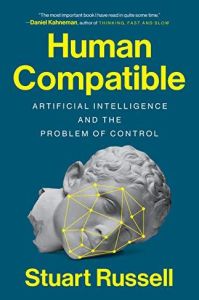Join getAbstract to access the summary!

Join getAbstract to access the summary!
Stuart Russell
Human Compatible
Artificial Intelligence and the Problem of Control
Viking, 2019
What's inside?
The approach of artificial general intelligence demands a new relationship between humans and machines.
Recommendation
If asked to predict the most significant occurrence in the future of humans, the best answer would be the advent of superintelligent artificial intelligence (AI). Superintelligent AI might help human beings avert climate disaster, cure all diseases, and much more. Superintelligent AI might also usher in the end of human history. The quest for AI has always been for increasingly intelligent machines. University of California, Berkeley, computer science professor Stuart Russell suggests that people should instead generate intelligent machines that benefit human life.
Summary
About the Author
Stuart Russell, PhD, is a professor of computer science at the University of California, Berkeley. He served as the vice chair of the World Economic Forum’s Council on AI and Robotics and as an adviser to the United Nations on arms control.


















Comment on this summary